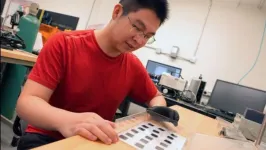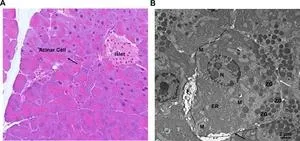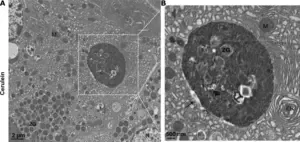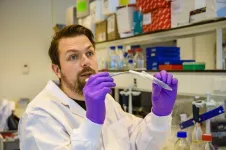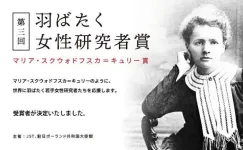(Press-News.org) Splash a few drops of water on a hot pan and if the pan is hot enough, the water will sizzle and the droplets of water seem to roll and float, hovering above the surface.
The temperature at which this phenomenon, called the Leidenfrost effect, occurs is predictable, usually happening above 230 degrees Celsius. The team of Jiangtao Cheng, associate professor in the Virginia Tech Department of Mechanical Engineering, has discovered a method to create the aquatic levitation at a much lower temperature, and the results have been published in Nature Physics. Alongside first author and Ph.D. student Wenge Huang, Cheng's team collaborated with Oak Ridge National Lab and Dalian University of Technology for sections of the research.
The discovery has great potential in heat transfer applications such as the cooling of industrial machines and surface fouling cleaning for heat exchangers. It also could help prevent damage and even disaster to nuclear machinery.
Currently, there are more than 90 licensed operable nuclear reactors in the U.S. that power tens of millions of homes, anchor local communities, and actually account for half of the country’s clean energy electricity production. It requires resources to stabilize and cool those reactors, and heat transfer is crucial for normal operations.
The physics of hovering water
For three centuries, the Leidenfrost effect has been a well-known phenomenon among physicists that establishes the temperature at which water droplets hover on a bed of their own vapor. While it has been widely documented to start at 230 degrees Celsius, Cheng and his team have pushed that limit much lower.
The effect occurs because there are two different states of water living together. If we could see the water at the droplet level, we would observe that all of a droplet doesn’t boil at the surface, only part of it. The heat vaporizes the bottom, but the energy doesn’t travel through the entire droplet. The liquid portion above the vapor is receiving less energy because much of it is used to boil the bottom. That liquid portion remains intact, and this is what we see floating on its own layer of vapor. This has been referred to since its discover in the 18th century as the Leidenfrost effect, named for German physician Johann Gottlob Leidenfrost.
That hot temperature is well above the 100 degree Celsius boiling point of water because the heat must be high enough to instantly form a vapor layer. Too low, and the droplets don’t hover. Too high, and the heat will vaporize the entire droplet.
New work at the surface
The traditional measurement of the Leidenfrost effect assumes that the heated surface is flat, which causes the heat to hit the water droplets uniformly. Working in the Virginia Tech Fluid Physics Lab, Cheng’s team has found a way to lower the starting point of the effect by producing a surface covered with micropillars.
“Like the papillae on a lotus leaf, micropillars do more than decorate the surface, said Cheng. “They give the surface new properties.”
The micropillars designed by Cheng’s team are 0.08 millimeters tall, roughly the same as the width of a human hair. They are arranged in a regular pattern of 0.12 millimeters apart. A droplet of water encompasses 100 or more of them. These tiny pillars press into a water droplet, releasing heat into the interior of the droplet and making it boil more quickly.
Compared to the traditional view that the Leidenfrost effect triggers at 230 degrees Celsius, the fin-array-like micropillars press more heat into the water than a flat surface. This causes microdroplets to levitate and jump off the surface within milliseconds at lower temperatures because the speed of boiling can be controlled by changing the height of the pillars.
Lowering the limits of Leidenfrost
When the textured surface was heated, the team discovered that the temperature at which the floating effect was achieved was significantly lower than that of a flat surface, starting at 130 degrees Celsius.
Not only is this a novel discovery for the understanding of the Leidenfrost effect, it is a twist on the limits previously imagined. A 2021 study from Emory University found that the properties of water actually caused the Leidenfrost effect to fail when the temperature of the heated surface lowers to 140 degrees. Using the micropillars created by Cheng’s team, the effect is sustainable even 10 degrees below that.
“We thought the micropillars would change the behaviors of this well-known phenomenon, but our results defied even our own imaginations,” said Cheng. “The observed bubble-droplet interactions are a big discovery for boiling heat transfer.”
The Leidenfrost effect is more than an intriguing phenomenon to watch, it is also a critical point in heat transfer. When water boils, it is most efficiently removing heat from a surface. In applications such as machine cooling, this means that adapting a hot surface to the textured approach presented by Cheng’s team gets heat out more quickly, lowering the possibility of damages caused when a machine gets too hot.
“Our research can prevent disasters such as vapor explosions, which pose significant threats to industrial heat transfer equipment,” said Huang. “Vapor explosions occur when vapor bubbles within a liquid rapidly expand due to the present of intense heat source nearby. One example of where this risk is particularly pertinent is in nuclear plants, where the surface structure of heat exchangers can influence vapor bubble growth and potentially trigger such explosions. Through our theoretical exploration in the paper, we investigate how surface structure affects the growth mode of vapor bubbles, providing valuable insights into controlling and mitigating the risk of vapor explosions.”
Another challenge addressed by the team is the impurities fluids leave behind in the textures of rough surfaces, posing challenges for self-cleaning. Under spray cleaning or rinsing conditions, neither conventional Leidenfrost nor cold droplets at room temperature can fully eliminate deposited particulates from surface roughness. Using Cheng’s strategy, the generation of vapor bubbles is able to dislodge those particles from surface roughness and suspend them in the droplet. This means that the boiling bubbles can both move heat and impurities away from the surface.
END
Virginia Tech researcher’s breakthrough discovery uses engineered surfaces to shed heat
When it comes to cooling equipment like nuclear reactors, every degree counts
2024-05-24
ELSE PRESS RELEASES FROM THIS DATE:
How a tiny device could lead to big physics discoveries and better lasers
2024-05-24
Researchers at Rensselaer Polytechnic Institute have fabricated a device no wider than a human hair that will help physicists investigate the fundamental nature of matter and light. Their findings, published in the journal Nature Nanotechnology, could also support the development of more efficient lasers, which are used in fields ranging from medicine to manufacturing.
The device is made of a special kind of material called a photonic topological insulator. A photonic topological insulator can guide photons, the wave-like particles that make up light, ...
Ambitious targets are needed to end ocean plastic pollution by 2100
2024-05-24
The study, a collaboration between researchers at Imperial College London and GNS Science, suggests that reducing plastic pollution by 5% per year would stabilize the level of microplastics – plastics less than 5 mm in length – in the surface oceans.
However, the modelling shows that even reducing pollution by 20% per year would not significantly reduce existing microplastics levels, meaning they will persist in our oceans beyond 2100.
Microplastics have been found to be circulating in all of the Earth’s oceans and some of the greatest concentrations of them are thousands of miles from land. These tiny particles ...
Boost for research aiming to cure chronic diseases in an aging population
2024-05-24
The DRIVE-RM consortium, led by Professor of Experimental Nephrology Marianne Verhaar from UMC Utrecht, has been awarded €37.5 million under the prestigious NWO SUMMIT program. The SUMMIT grant recognizes world-class collaborations, while further strengthening these partnerships. The DRIVE-RM collaboration involves UMC Utrecht, Utrecht University, Eindhoven University of Technology, Maastricht University, and the Hubrecht Institute, focusing on smart materials that assist the body in healing.
Regenerative medicine involves repairing or replacing damaged tissues and organs by leveraging the body's own healing processes. DRIVE-RM ...
Quadruple therapies and the future of multiple myeloma treatment
2024-05-24
MIAMI, FLORIDA (MAY 23, 2024) – The treatment landscape for multiple myeloma, the second most common blood cancer, is shifting rapidly, with newly diagnosed patients increasingly being treated with a four-part drug combination that includes a new immunotherapy agent.
Over the last decade, options have evolved from double, to triple to quadruple combination therapies. What do these new options mean for patients, and how will treatment change in the future?
C. Ola Landgren, M.D., Ph.D., will ...
Announcement of winners for the third “Marie Sklodowska Curie Award”
2024-05-24
JST has selected winners for the third Marie Sklodowska Curie Award for young female researchers. For the third Marie Sklodowska Curie Award, we accepted applications from October 2 to December 11, 2023. Through document screenings and interviews with external experts, we have selected one Grand Prize winner and two Inspiration Prize winners. JEOL Ltd. will award 1M yen for the Grand Prize and 500K yen for each Inspiration Prize.
JST recognizes the importance of initiatives designed to promote the activities of female researchers in science, technology, and innovation, and based on this belief we established the “Marie ...
Baby bonuses and wedding bells: how life's big moments can challenge startups
2024-05-24
Life-changing events like the birth of a child, the purchase of a new home, or a lottery win could threaten the survival of a new business venture, research from Edith Cowan University (ECU) has found.
A recent study led by ECU’s Professor of Entrepreneurship and Innovation Pi-Shen Seet with Associate Professor Wee-Liang Tan from the Singapore Management University found that positive family events had a comparatively greater influence, albeit negatively, on the survival of a new venture, compared with negative events.
“A positive family event, like the birth of a child, often has an emotional spin-on effect for an entrepreneur ...
Wagner named 2024 recipient of the ASME George Westinghouse Gold Medal
2024-05-24
Robert Wagner, associate laboratory director for the Energy Science and Technology Directorate at the Department of Energy’s Oak Ridge National Laboratory, has been selected to receive the George Westinghouse Gold Medal from the American Society of Mechanical Engineers, or ASME. The award recognizes his work to advance state-of-the-art clean power generation systems through research on combustion, fuel technologies and controls.
Wagner will be presented the award in October during ASME’s ...
Sylvester research shows new treatment may enable more patients with high-risk blood cancers to receive stem cell transplants
2024-05-24
MIAMI, FLORIDA (MAY 23, 2024) – A new treatment approach using an older drug may enable more patients with high-risk blood cancers to receive transplanted stem cells from unrelated, partially matched donors, according to a study conducted by researchers at Sylvester Comprehensive Cancer Center at the University of Miami Miller School of Medicine and colleagues.
Results to be presented at the annual meetings of the American Society of Clinical Oncology (ASCO) and the European Hematology Association suggest the new approach may expand the donor pool, with patients from underrepresented racial and ethnic ...
Internationally trained female oncologists face many discrimination challenges in the U.S.
2024-05-24
MIAMI, FLORIDA (May 23, 2024) – Coral Olazagasti expected a relatively smooth transition when she moved to New York to start her residency after graduating from medical school in her native Puerto Rico. But that proved wishful thinking.
She not only experienced major culture shock, but also her superiors and colleagues often chastised her for speaking too loudly and joked about her accent.
“Puerto Rico is a U.S. territory so when I moved to New York, I thought it wasn’t going to be a big change,” said Olazagasti, ...
Fred Hutch at ASCO: Progress in treating metastatic cancer, hospice access for cancer patients, use of machine learning with CAR T-cell therapy
2024-05-24
The 2024 annual meeting of the American Society of Clinical Oncology (ASCO) will take place in Chicago and online May 31-June 4.
Below are highlights of Fred Hutch Cancer Center research to be presented at the conference and experts available to comment on news. You can follow Fred Hutch on social media for additional updates and check out Fred Hutch booth #14018 in the exhibit hall.
For interview requests with Fred Hutch experts, please contact media@fredhutch.org.
Prostate cancer
Prostate cancer is the most common cancer among men in the United States and, according to the National Cancer Institute, ...
LAST 30 PRESS RELEASES:
Medicare patients get different stroke care depending on plan, analysis reveals
Polyploidy-induced senescence may drive aging, tissue repair, and cancer risk
Study shows that treating patients with lifestyle medicine may help reduce clinician burnout
Experimental and numerical framework for acoustic streaming prediction in mid-air phased arrays
Ancestral motif enables broad DNA binding by NIN, a master regulator of rhizobial symbiosis
Macrophage immune cells need constant reminders to retain memories of prior infections
Ultra-endurance running may accelerate aging and breakdown of red blood cells
Ancient mind-body practice proven to lower blood pressure in clinical trial
SwRI to create advanced Product Lifecycle Management system for the Air Force
Natural selection operates on multiple levels, comprehensive review of scientific studies shows
Developing a national research program on liquid metals for fusion
AI-powered ECG could help guide lifelong heart monitoring for patients with repaired tetralogy of fallot
Global shark bites return to average in 2025, with a smaller proportion in the United States
Millions are unaware of heart risks that don’t start in the heart
What freezing plants in blocks of ice can tell us about the future of Svalbard’s plant communities
A new vascularized tissueoid-on-a-chip model for liver regeneration and transplant rejection
Augmented reality menus may help restaurants attract more customers, improve brand perceptions
Power grids to epidemics: study shows small patterns trigger systemic failures
Computational insights into the interactions of andrographolide derivative SRJ09 with histone deacetylase for the management of beta thalassemia
A genetic brake that forms our muscles
CHEST announces first class of certified critical care advanced practice providers awarded CCAPP Designation
Jeonbuk National University researchers develop an innovative prussian-blue based electrode for effective and efficient cesium removal
Self-organization of cell-sized chiral rotating actin rings driven by a chiral myosin
Report: US history polarizes generations, but has potential to unite
Tiny bubbles, big breakthrough: Cracking cancer’s “fortress”
A biological material that becomes stronger when wet could replace plastics
Glacial feast: Seals caught closer to glaciers had fuller stomachs
Get the picture? High-tech, low-cost lens focuses on global consumer markets
Antimicrobial resistance in foodborne bacteria remains a public health concern in Europe
Safer batteries for storing energy at massive scale
[Press-News.org] Virginia Tech researcher’s breakthrough discovery uses engineered surfaces to shed heatWhen it comes to cooling equipment like nuclear reactors, every degree counts
